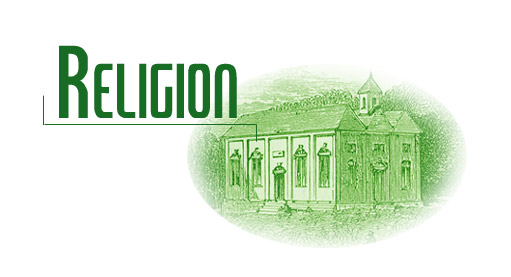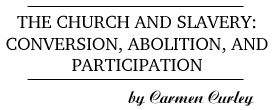
The
church was present throughout the life span of slavery in the New World. Contrary to popular opinion, Christianity
was by no means solely an anti-slavery advocate. For the most part there is plenty of evidence
to support the Christian church’s struggle for the abolition of the
despicable institution, but there is also evidence to defend the contrary. Because slavery was such a lucrative business,
many in the church continued to profit from the despicable institution.
Notwithstanding this, there were still many who were adamant abolitionists.
There
are obviously many different forms of religion derived from Catholic
and Protestant roots, as well as an infinite number of independent beliefs.
Different Christian sects had different ways of addressing the sensitive
topic of African bondage. The
religions on which this paper will focus are the Catholic church and
the Quakers, Baptists, and Anglicans, which are all denominations
within the Protestant tradition. There were differences of opinion both
among and within these denomination when it
came to slavery. Even the Quakers who developed a
firm objection to slavery, had problems convincing all of their members
that it was evil. Some
of them even owned slaves.1
Albert
Barnes, a nineteenth-century abolitionist, suggested that the institution
of Christianity alone was powerful enough to have stopped or even prevented
slavery from developing in the New World.2 The church,
he argued was the great opponent of slavery during the Roman empire, as well as during colonialism in
the New
World.3 The
latter point is particularly debatable. Yet Barnes believed that if all of the different
denominations pulled together there would be no other power strong enough
to combat it. Slavery would have
been non-existent.4 Still, the fact remains that many slave-holders
were Christians, and some were even members of the clergy. Even some missionaries to the colonies owned
slaves. Bartolomé
de Las Casas, a Catholic Priest and missionary
who stationed in Hispaniola in the early sixteenth
century, owned Native American slaves, and later swapped them in for
the more durable and work-friendly African slaves.
He wrote to Spain suggesting that the slave holders
cease the use of Native Americans as slaves because they were unable
to cope with the harsh working conditions and European diseases that
were wiping them out. The Africans
on the other hand were sturdier, and were better equipped to withstand
European disease.
The
Catholic Church had a major presence in slavery in the New World. According to Richard Miller, Catholic
countries were “the prime movers in the revival of slavery in the Old World and the introduction of it into the
New
World.” The five major countries that dominated slavery
and the slave trade in the New World were either Catholic, or still retained strong Catholic
influences including: Spain, Portugal, France, and England, as well as the Dutch.5 Christopher
Columbus himself thought first of enslaving the Natives that he encountered
upon the discovery of the island of Hispaniola in 1492. Within the first month of his arrival Columbus
seized six young men that had canoed up alongside his ship as prisoners
to be sent back to the Catholic King and Queen of Spain as slaves.
He also had seven women and three children captured because he
believed that the men would work better as servants if they had women
around.6 He was also very fixed on sending the Natives
to Spain to be converted to Catholicism.
The Church of Rome did not consider the African slave a human
being until 1839. Miller adds that this only occurred after the
abolition movement by the American Anti-slavery Society, and “the certainty
of the handwriting on the wall that someday slavery would be abolished
. . .”.7
The
Quakers, one of the earliest opponents to slavery, believed that cruel
treatment by masters drove slaves to decadence and ungodliness. The Quakers knew that they could not end this
dominant institution on their own and like many other abolitionists,
turned to British government for help.
In a 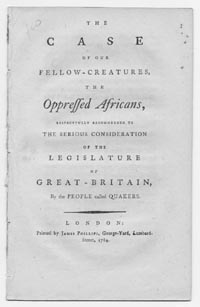 petition
to British Parliament in 1784, the Quakers pleaded the case that slavery
must be ended not only to save the African slaves from evil, but also
the English and all humanity as well.
Slavery was impugning the reputation of Great Britain.
The Quakers felt that it was their duty to save Britain and the slaves from the evilness
of slavery.8 The Quakers sympathized with the Africans
on many levels. They were especially bothered by the way in which many
Africans were brought to the New World. Many were kidnapped
and stolen from their homes. Others
were lured under false pretenses. Also
the inter-tribal wars between the Africans which were supported by the
slave traders, were destroying their societies.9 Not
only was slavery terrible for those directly involved, but the entire
continent of Africa suffered. petition
to British Parliament in 1784, the Quakers pleaded the case that slavery
must be ended not only to save the African slaves from evil, but also
the English and all humanity as well.
Slavery was impugning the reputation of Great Britain.
The Quakers felt that it was their duty to save Britain and the slaves from the evilness
of slavery.8 The Quakers sympathized with the Africans
on many levels. They were especially bothered by the way in which many
Africans were brought to the New World. Many were kidnapped
and stolen from their homes. Others
were lured under false pretenses. Also
the inter-tribal wars between the Africans which were supported by the
slave traders, were destroying their societies.9 Not
only was slavery terrible for those directly involved, but the entire
continent of Africa suffered.
There
were many whites, even in the British colonies of the West Indies, who sympathized with the slaves.
During the mid 19th century, there were letters, and petitions
written to prominent religious leaders from both missionaries living
in the colonies as well as church members in England who were aware of and concerned with
what was going on. There were also pamphlets released in the colonies
as well as England meant especially for public viewing.
Abolitionists knew that they would need the support of the general
population if they were to convince Parliament that abolition was a
national phenomenon. Most petitioners pleaded for the immediate
release of the slaves. There
were others that were willing to compromise and allow for a gradual
release program in which the slaves would be given proper preparations
for entering the free world. An
Anglican priest argues that “if they deem a
slave not ready to be freed for some reason, they must take that into
consideration, but the have no right to detain an innocent man…. Any
detention must be as brief as possible and the least bit uncomfortable
if seen as needed for his own welfare”.10 This was taken from a published sermon and dedication
from Reverend Wilkes to the Archbishop of Canterbury in England.
He believed that slavery was absolutely contrary to the Ten Commandments
and no man had the “moral right” to hold neither any person nor his
children in subjugation, that had not committed
a crime.11 Wilkes
also believed that it was the duty of the Church to denounce slavery,
both publicly and officially. He
blamed the Church for not ending slavery earlier. Not only did the Church not condemn slavery
and those who practiced it, but they let it continue, not to mention
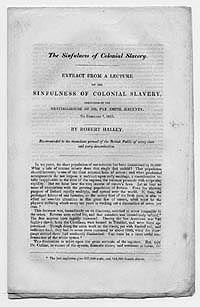 participated.12 To many slavery was the lowest form of human existence, and
no person should be delivered into such a state. In the words of Andrew Thomson “to be a slave
is the basest style and state of man, and that to be a free man is the
highest distinction and his truest glory.”13 A Reverend Wilkes believed that slavery was
based on an “economic and political greed.”14 Robert Halley condemned the economic stresses
of slavery; warning that “the gains of slave-labour
are daily diminishing ‘Your gold and silver is cankered, and the rust of them shall be a witness against
you, and shall eat your flesh as it were fire’.”15 In
contradiction of the argument that, once released, the African slaves
would become idle and unruly, Halley refers to many freed and escaped
slaves who were living normal and productive lives in many of the West
Indian colonies: participated.12 To many slavery was the lowest form of human existence, and
no person should be delivered into such a state. In the words of Andrew Thomson “to be a slave
is the basest style and state of man, and that to be a free man is the
highest distinction and his truest glory.”13 A Reverend Wilkes believed that slavery was
based on an “economic and political greed.”14 Robert Halley condemned the economic stresses
of slavery; warning that “the gains of slave-labour
are daily diminishing ‘Your gold and silver is cankered, and the rust of them shall be a witness against
you, and shall eat your flesh as it were fire’.”15 In
contradiction of the argument that, once released, the African slaves
would become idle and unruly, Halley refers to many freed and escaped
slaves who were living normal and productive lives in many of the West
Indian colonies:
Go to Suriname and there are Negroes,
who forcibly recovered their liberty from the Dutch, now estimated at
nearly 20,000, industriously occupied upon their lands . . . Go to Trinidad
where are the fugitive slaves from American bondage- or to St. Lucia,
where are those who have escaped from the French Islands of Martinique-
all usefully and industriously occupied; in the latter instance, even
to the introduction of a new manufacturing of pottery into the island,
having built the kiln with their own hands.16
Even though there were missionaries
in the Islands who were devoted to the abolition
of slavery, there were some that were just as bad as the plantation
holders when it came to the treatment of their slaves.
Halley argued that the Baptist missionaries in Barbados petitioned for the emancipation of
slaves or at least the improvement of their living conditions, yet they
were severely mistreating their own slaves.
He also reported that the missionaries 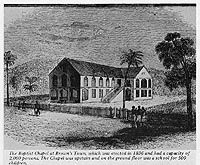 neglected
the slaves' religious lessons, and did not permit their slaves to learn
to read. The slaves were not even given their Sabbath
to worship. This time was allotted
to them to care for their own land.17 Robert
Halley had similar comments on the slaves in Mauritius and Jamaica.
“The slave must work on the Sabbath, and has little time for
himself. . . The last Jamaica slave code allows twenty-six Saturdays
in the year, which I have seen disingenuously represented as holidays.
But as twenty –six days of labour, even that climate, are totally insufficient to maintain
a family, he must be compelled to cultivate his provision-ground on
the Sabbath.”18 Here it was not only slaves belonging to the
missionaries, but those belonging to white plantation owners. Nancy
Prince was disappointed with the condition of the Baptist churches in
Jamaica.
She said that the meeting houses were unruly, and seemed more
like “playhouses than
a place of worship.”19 She noted
that the churches were over-crowed and unorganized. She also noted that
the many of the blacks were underdressed, some without shoes.20 neglected
the slaves' religious lessons, and did not permit their slaves to learn
to read. The slaves were not even given their Sabbath
to worship. This time was allotted
to them to care for their own land.17 Robert
Halley had similar comments on the slaves in Mauritius and Jamaica.
“The slave must work on the Sabbath, and has little time for
himself. . . The last Jamaica slave code allows twenty-six Saturdays
in the year, which I have seen disingenuously represented as holidays.
But as twenty –six days of labour, even that climate, are totally insufficient to maintain
a family, he must be compelled to cultivate his provision-ground on
the Sabbath.”18 Here it was not only slaves belonging to the
missionaries, but those belonging to white plantation owners. Nancy
Prince was disappointed with the condition of the Baptist churches in
Jamaica.
She said that the meeting houses were unruly, and seemed more
like “playhouses than
a place of worship.”19 She noted
that the churches were over-crowed and unorganized. She also noted that
the many of the blacks were underdressed, some without shoes.20
Obviously
Christianity played a variety of roles in slavery in the New World.
There were missionaries sent to the colonies to convert the slaves
into human beings by Christianizing them.
Others went on their own accord, and wrote about some of the
atrocities that the enslaved had to endure. Nancy Prince, a free black
who herself had been baptized into the Baptist religion, went to Jamaica in 1840 for just that purpose.
She was hoping to “to raise up and encourage the emancipated inhabitants and teach
the young children to read and work, to fear God, and put their trust
in the Savior.”21
There were also those
who argued that Whites could rid themselves of the abolition debate
by cautiously converting slaves to Christianity. Sir George Henry Rose a member of British Parliament
wrote a letter in 1823 ,arguing that the restlessness
of the slaves in the West Indies could be quenched if only they were
converted to Christianity. The
slaves were in such a terrible state partially because they had not
been properly instructed in the Christian ways. He believed that “the
Gospel, when received into the heart of man, is able by motives both
of this world and the world to come, to lead the reckless and ignorant
barbarian from blind superstition, vice, and sensuality, through hope
and fear, to rational obedience, order, industry, and morality.”22
Christianity could also help the slave holder keep his slaves in line
by teaching them through the ‘Gospel’ that they must obey their master
and not question his law. Whites
must in some way filter the truth otherwise the slaves would eventually
awaken to that which they were entitled to as Christians and demand
freedom and equality. This had already happened in Jamaica and Haiti
to which Rose responds; “the blacks have learned too much, if we teach
the no more; we must guide their curiosity to things innocent and useful;
we must consider that the effusions of our licentious press cannot but
reach them, and produce the most mischievous effects unless sound instruction
counteract its poison, or reduce them to reject it.”23
Christians, though in many
cases, benevolent, had many different views about how slaves and the
institution of slavery should have been dealt with. Many times there
were differences within the many sects on not only the abolition of
slavery, but whether or not church members should own slaves themselves.
Like the many dynamics of the institution of slavery, the Christianity
sponsored many different opinions. We acknowledge however, that without the support
of religion the abolition of slavery would have taken an even slower
route.
End Notes
1 Jean R. Soderlund, Quakers & Slavery:
A Divided Spirit, (Princeton, 1985), 5.
2 Albert Barnes, The Church and Slavery, (Philadelphia, 1857), 28.
5 Richard Roscoe Miller, Slavery and
Catholicism, (Durham, 1957), 18.
8 Society of Friends. London Yearly Meeting.
Meeting For Sufferings. The Case of Our
Fellow-Creatures, the Oppressed Africans, Respectfully Recommended to the
Serious Consideration of the Legislature of Great Britain, by the People Called
the Quakers, (London, 1784), 3.
10 Rev. Samuel Charles Wilkes, The Duty of Prompt and
Complete abolition of Colonial Slavery: A Sermon, (London, 1830), 8.
13 Andrew Thomson, Slavery Not Sanctioned But Condemned
by Christianity, (London, 1829), 5.
15 Robert Halley, The
Sinfulness of Colonial Slavery: extract from a lecture on “The Sinfulness of
Colonial Slavery”. (London: [1833?]), 4.
19 Nancy Prince, A Black
Woman’s Odyssey Through Russia and Jamaica. (New York: Markus Wiener Publishing,
1990, repr. of 1850 orig.), 51.
22 Sir George Henry Rose, A Letter On
The Means and Importance of Converting the Slaves in the West Indies to
Christianity, (London, 1823), 2.
23 Ibid., 4.
Bibliography
Barnes,
Albert, The Church and Slavery. Philadelphia: Parry and McMillan, 1857.
Halley, Robert, The
Sinfulness of Colonial Slavery: extract from a lecture on “The Sinfulness
of Colonial Slavery”. London: J. Haddon, [1833?].
Miller, Richard Roscoe, Slavery and Catholicism. Durham: North State, 1957.
Prince, Nancy, A
Black Woman’s Odyssey Through Russia and Jamaica. New York: Markus Wiener Publishing, 1990.
Rose, Sir G. H., A Letter On The Means
and Importance of Converting the Slaves in the West Indies to Christianity. London: William Clowes,
1883.
Society of Friends.
London Yearly Meeting. Meeting
For Sufferings. The Case of Our Fellow-Creatures, the Oppressed
Africans, Respectfully Recommended to the Serious Consideration of
the Legislature of Great Britain, by the People Called the Quakers. London: J. Phillips, 1784.
Suderlund, John, R., Quakers & Slavery:
A Divided Spirit. Princeton: Princeton University
Press,1985.
Thomas, Andrew, Slavery Not Sanctioned
But Condemned by Christianity.
London: Ellerton and Henderson Printers, 1829.
Wilkes, Rev. Samuel Charles, The
Duty of Prompt and Complete abolition of Colonial Slavery: A Sermon. London: J. Hatchard
and Son, 1830.
|
